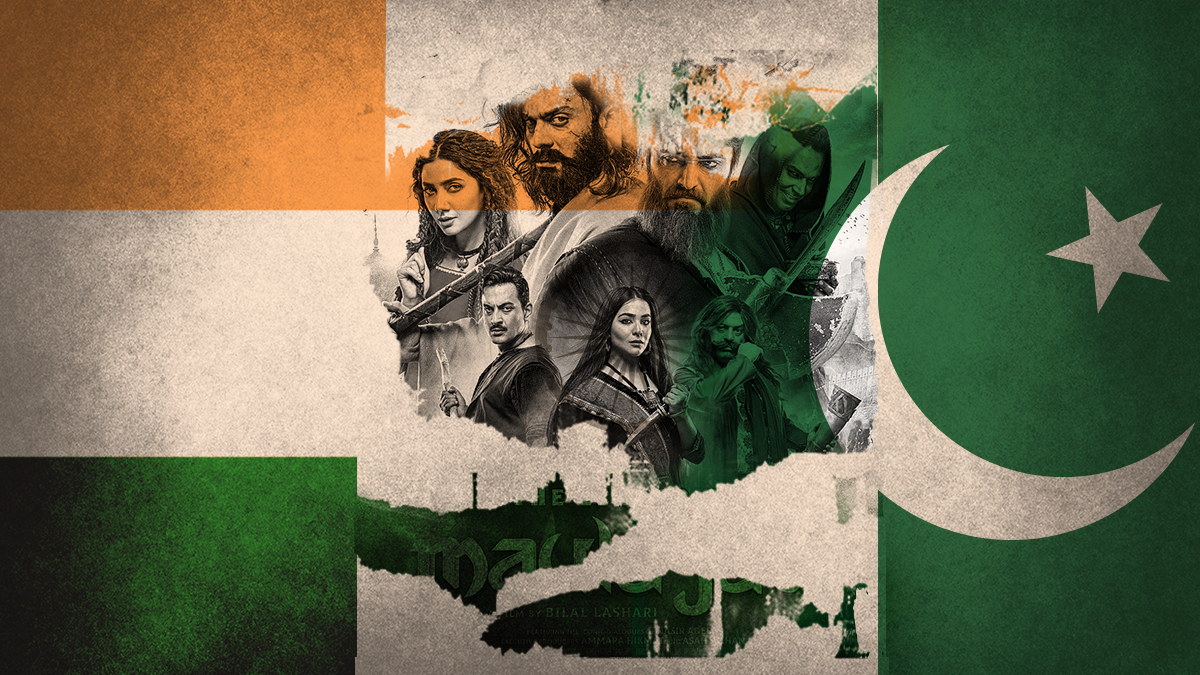As the hit 2022 film “The Legend of Maula Jatt”, the best-performing movie in Pakistan’s history, was set to be released in one of the world’s largest movie-watching markets last weekend, it was abruptly canceled. No official reason was given by India’s film authorities, but right-wing Indian politicians took credit for the change of plan.
Pakistani films have not been screened by India’s lucrative film market since 2011. Though there’s no official ban, New Delhi adheres to an unofficial prohibition aimed at reducing the presence of Pakistani art on Indian screens. This has been expanded under Prime Minister Narendra Modi’s Hindu-nationalist rule to also exclude Pakistani actors from performing in India’s Bollywood.
It’s not just movies. Despite the surging popularity of Pakistani stars among international and Indian audiences, India’s right-wing media and politicians have backed efforts to keep Pakistanis off-screen. But the bans have also extended into other arts and media. Pakistani music is ridiculously popular in India, but Pakistani musicians are not allowed to perform in the country. In December, Indian authorities banned a Pakistan-based streaming service. The ban on Pakistani culture has even beset India’s biggest religion: cricket.
The Indian cricket team has refused to host Pakistan or visit Pakistan since 2009 (the two sides play internationally in matches that are amongst the most viewed in the world). On the local level, the India Premier League, one of the planet’s most lucrative, has not drafted a single Pakistani cricketer since 2009, despite Pakistan’s players being among the finest in the game and threats of legal action by Pakistani authorities.
Pakistan was the first to press the cancel button on Indian movies. After the war in 1965, a strict ban was imposed on screening Indian cinema, and it wasn’t lifted until 2008. Still, the wildly popular Bollywood productions were available in pirated formats for decades across the country. While some Indian (and other foreign movies, but also a long list of local ones) are still banned by moribund Pakistani censors — for reasons like “inaccurately depicting” Pakistan, Islam, or other “taboo” subjects, including menstruation — some Bollywood productions still manage to get screened in Pakistan.
Not so much in India, where anti-Pakistan sentiment has surged since the 2008 Mumbai terror attacks (that were traced back to Lashkar-e-Taiba, a terrorist group that’s been linked to Pakistan’s spy agency), and has been compounded by the advent of Modi’s muscular nationalism. The latter has promoted a loud and proud anti-Muslim sentiment that targets Indian Muslims as well as Pakistanis.
While the heated rhetoric between New Delhi and Islamabad continues, the South Asian neighbors, with a combined population of over 1.6 billion and with each still retaining millions of relatives and friends from the other side, remain among the most culturally disconnected in the world. Trade remains mostly suspended, there are no direct flights, and educational and people-to-people exchanges are essentially over.
The cancellation of this particular Pakistani flick is a crushing disappointment for millions of moviegoers in India, as well as actors and producers in Pakistan, all of whom point squarely at politics.
“It’s quite ridiculous. Neither side has the courage to officially declare a ban. Unofficially, they’re both driven by expeditious political goals,” says Maria Wasti, a celebrated actor and member of Pakistan’s United Producers Association.
“Art and culture have no boundaries. Moreover, art and culture make excellent political and diplomatic resources. But neither side is using them properly.”
While GZERO reached out to Zee Cinema (which has purchased the rights to the shelved Pakistani production) and did not get a response, India’s anti-Muslim wave is also hurting its own film industry.
The reason for not screening this film in India “is the same reason their own films are in jeopardy,” says its producer, Ali Murtaza, of AAA Motion Pictures, referring to ongoing violence and controversy around “Pathaan” – India’s biggest film in years that is about to hit the theaters. It features an Indian Muslim secret agent falling in love with a Hindu woman – a theme right-wing Hindu groups find objectionable.
“There’s no official reason we’ve been given. We even got the movie through the regional censor boards. But there’s an extreme view of Pakistan and Pakistani products,” says Murtaza.
Too bad, for “The Legend of Maula Jatt '' is being hailed as legendary by the less divided international South Asian diaspora. It’s a remake of a 1979 classic from Lollywood (the name given to the Pakistani film industry, based in Lahore) that was actually banned in Islamist Pakistan for being ahead of its time. A colorful, lusty, and violent period piece (that has earned over 1 billion rupees in Pakistan and $10 million internationally since its release in October), the film has received accolades at home and abroad.
But more importantly, the film is in Punjabi, one of the three most common languages spoken by millions of Indians and Pakistanis. While Hindi and Urdu are the lingua franca of government in India and Pakistan respectively, Punjabi is more informal and spoken by more than 200 million people across the subcontinent. A colorful, guttural, and folksy tongue, Punjabi is considered the ultimate South Asian icebreaker: a congenial uniter, not a formal divider.
India’s press is saying that the film’s uniting qualities are the reasons it has been denied a screening in their country, despite its international success and local appeal. Set and costumed in an idealized version of a united Punjab that is neither Indian nor Pakistani, the film firmly challenges the “Us vs. Them” narrative prevalent in mainstream Indian and Pakistani productions.
